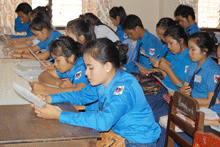
Taking Steps to Retain Health Workers in Rural Areas of Lao People’s Democratic Republic
Half of the world’s population lives in rural areas, but they are served by only 24% of physicians and 38% of nurses worldwide, according to the World Health Organization. Health workers are often not motivated to accept or remain at posts in rural and remote areas, for a variety of reasons. From May 16-June 3, CapacityPlus’s Wanda Jaskiewicz and Laura Wurts and the WHO worked with the Lao People’s Democratic Republic (PDR) Ministry of Health to conduct a rapid discrete choice experiment (DCE). This will help the Ministry determine priority incentive packages to attract and retain health workers in rural areas.
From May 16-June 3, CapacityPlus’s Wanda Jaskiewicz and Laura Wurts and the WHO worked with the Lao People’s Democratic Republic (PDR) Ministry of Health to conduct a rapid discrete choice experiment (DCE). This will help the Ministry determine priority incentive packages to attract and retain health workers in rural areas.
Jaskiewicz and Wurts led capacity-building sessions with the Ministry on conducting a rapid DCE survey using CapacityPlus’s Rapid DCE Tool. The tool is a powerful research method used to determine health workers’ preferences regarding different employment options and to predict health workers’ decision-making using hypothetical choice data.
Working together, the team administered the DCE survey to 483 health workers and 970 students from three target cadres (doctors, nurse midwives, and medical assistants) in three provinces. Next they cleaned and analyzed the data and presented preliminary results to the Ministry’s Human Resources for Health Steering Committee. A final report and recommendations are forthcoming in July, and technical assistance is planned for costing the retention interventions in September.
This collaboration builds on extensive work led by the WHO to help countries implement effective retention strategies.
Related items:
Photo by Laura Wurts. (Nursing students from Champasak Provincial College completing the DCE survey)


